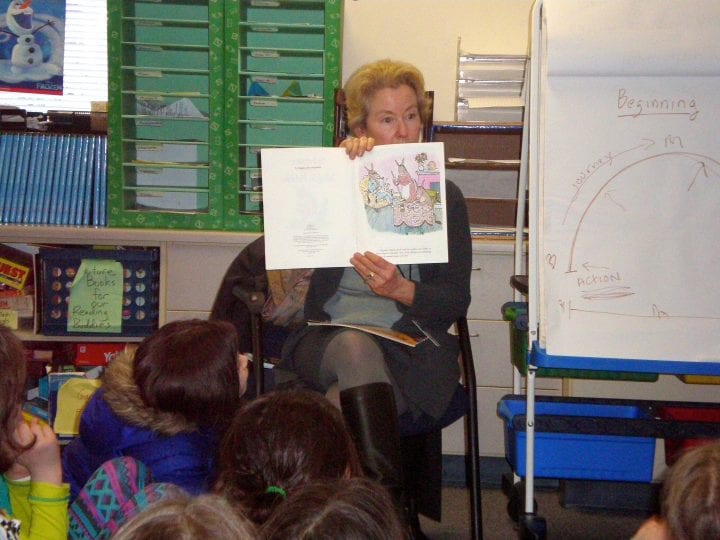
WITS Voices: Writing Hero Stories with Third Graders
April 28, 2016
By Clare Hodgson Meeker, WITS Writer-in-Residence
Don’t ask kids what they want to be when they grow up but what problems do they want to solve.
―Jaime Casap, Google Global Education Evangelist
On my first day of a nine-week residency with third graders at Whittier Elementary, I gathered the students on a bright throw rug in the back of the classroom to talk about what makes a hero. I began by reading Shirley Climo’s story, King of the Birds.
The unlikely hero of Climo’s story is a wren, a small bird in a world of big birds, all of them arguing because they have no leader. Owl proposes a flying contest: whoever flies the highest will become king of the birds. Wren figures out a way to fly higher than the rest by hiding in Eagle’s feathers, taking flight once Eagle grows tired. When Wren returns, he shares what he has learned: the Earth is so big that every bird can sit peacefully upon it, if they would follow his lead. One by one, he divides the birds, sending them to live on land or on water, in the north or south. Finally, the bird kingdom settles down to live in peace.
“What do you think makes Wren a hero?” I asked.
“He solved the problem of the birds quarreling,” said one student.
“But people solve problems all the time,” said another student. “Does that make them heroes, too?” Suddenly, I flashed back to law school, where I had a certain professor who used the Socratic method of thinking to paint our arguments into a corner. These third graders were sharp!
“Most heroes are ordinary people, but they do something extraordinary,” I replied. “Think about a hero in today’s world. It could be someone in your family or in your school.”
I wrote on the white board: “A hero is someone who _____?” These were some of the students’ answers:
Rescues someone
Stops a bully
Makes the world a better place
Makes peace
Solves a problem
Shows leadership
We talked about the qualities of a hero. I asked them if a hero could be afraid. A student answered, “I might feel afraid to face a bully, but I would still do it to help a friend and make things right.”
“Do you think a person can be a hero if he or she fails to solve the problem?” This question stopped them for a moment.
Then one girl bravely spoke up: “They could still be a hero for trying.”
I ended the lesson with a writing exercise: think of a hero in your life and tell us what makes them a hero to you.
Now, the Whittier third graders are creating stories of heroes and superheroes saving the neighborhood from polluters or the Space Needle from aliens, rescuing kidnapped friends and family members, tackling bullies, stopping forest fires, and even rescuing dogs and cats from the recent gas explosion in the Greenwood neighborhood of Seattle. Many of them prefer to give their characters magical powers to help solve these problems.
Thinking through a story from beginning to end and finding a way for the hero to accomplish his or her task is a heroic effort for any writer. And what their heroes learn from the adventure gives these young authors new tools and confidence to deal with problems in their own lives.

Clare Hodgson Meeker is an award-winning author of 11 children’s books, including the Smithsonian Notable Book Lootas, Little Wave Eater. Her new book, Rhino Rescue!, published by National Geographic Kids, was just awarded a 2016 Junior Library Guild Selection. Clare teaches writing in schools throughout the northwest and at conferences such as this year’s 2016 Pacific Northwest Writers Conference in July. She is a member of the Seattle7Writers collective.